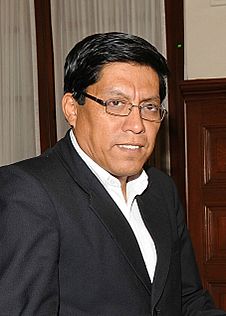Vicente Zeballos facts for kids
Quick facts for kids
Vicente Zeballos
|
|
|---|---|
 |
|
| Permanent Representative of Peru to the Organization of American States | |
| In office 27 August 2020 – 10 November 2020 |
|
| President | Martín Vizcarra |
| Preceded by | José Manuel Boza Orozco |
| Succeeded by | Hugo de Zela |
| Prime Minister of Peru | |
| In office 30 September 2019 – 15 July 2020 |
|
| President | Martín Vizcarra |
| Deputy | Desilú León Chempén |
| Preceded by | Salvador del Solar |
| Succeeded by | Pedro Cateriano |
| Minister of Justice and Human Rights | |
| In office 21 July 2018 – 30 September 2019 |
|
| President | Martín Vizcarra |
| Preceded by | Salvador Heresi |
| Succeeded by | Ana Teresa Revilla |
| Member of Congress | |
| In office 26 July 2011 – 30 September 2019 |
|
| Constituency | Moquegua |
| Mayor of Mariscal Nieto | |
| In office 1 January 2003 – 31 December 2006 |
|
| Personal details | |
| Born | 10 May 1963 Tacna, Peru |
| Nationality | |
| Political party | Independent (2015–present) |
| Other political affiliations |
Union for Peru (2001-2015) Peruvians for Change (non-affiliated member) (2016-2019) |
| Alma mater | Universidad Inca Garcilaso de la Vega (LLB) Complutense University of Madrid |
Vicente Antonio Zeballos Salinas (born May 10, 1963) is a Peruvian politician. He served as the Prime Minister of Peru from September 2019 to July 2020. Before that, he was the Minister of Justice and Human Rights.
Zeballos started his political journey as the mayor of Mariscal Nieto Province in Moquegua. This was from 2003 to 2006. Later, he became a member of the Peruvian Congress. He represented the Moquegua region.
In 2020, he was appointed as Peru's representative to the Organization of American States (OAS).
Contents
Early Life and Education
Vicente Antonio Zeballos Salinas was born on May 10, 1963. His birthplace was Tacna, Peru. He grew up in the city of Moquegua. He finished his high school studies there.
He went to the Inca Garcilaso de la Vega University. There, he studied law and political science. He earned a law degree. He also studied constitutional law in Madrid, Spain. He taught at the Private University of Tacna.
Political Career
Starting in Politics
Zeballos began his political career in 2001. He ran for a seat in the Peruvian Congress. He represented the Moquegua region. Even though he was not elected, he became well-known.
In 2002, he became the mayor of the Mariscal Nieto Province. He served in this role until 2006.
Serving in Congress (2011-2019)
In 2011, Vicente Zeballos was elected to the Peruvian Congress. He represented Moquegua. He was part of the National Solidarity Alliance. During his time in Congress, he worked on important committees. These included Education, Constitution, and Foreign Relations. He also led the Audit Commission for a year.
He was reelected to Congress in 2016. This time, he ran as an independent. He was part of the Peruvians for Change group. His term in Congress ended in 2019. This happened when the Congress was dissolved. He left his political group in 2017. This was to protest a decision by the president at the time.
Minister of Justice (2018-2019)
In July 2018, President Martín Vizcarra chose Zeballos to be the Minister of Justice and Human Rights. In this role, he worked on legal matters and human rights.
During his time as minister, he answered questions from Congress. These questions were about agreements with a Brazilian company. He also answered questions about a person who escaped from prison. He explained that different groups were responsible for the escape.
Becoming Prime Minister (2019-2020)
On September 30, 2019, Zeballos became the new Prime Minister of Peru. He took over after the previous Prime Minister resigned. As Prime Minister, he worked closely with President Vizcarra.
In October 2019, he shared the government's main goals. These included improving healthcare for everyone. They also aimed to increase the minimum wage. Other goals were fighting violence against women and improving public safety. They also focused on education and building new airports.
In March 2020, the first case of COVID-19 was confirmed in Peru. Zeballos stated that health plans were ready. He said all health groups were working together.
In May 2020, he went to Congress to get their support for his government. He received many votes in favor. This showed that Congress trusted his leadership.
Resigning from Office
Vicente Zeballos resigned as Prime Minister on July 15, 2020. This happened after some criticism about his work during the COVID-19 pandemic. After his resignation, Pedro Cateriano became the new Prime Minister.
Peru's Representative to the OAS
In 2020, Zeballos was appointed as Peru's Permanent Representative to the Organization of American States (OAS). The OAS is a group of countries in the Americas. They work together on issues like democracy and human rights.
His appointment was discussed by some former government officials. They raised concerns about his previous work.
See also
 In Spanish: Vicente Zeballos para niños
In Spanish: Vicente Zeballos para niños
 | Stephanie Wilson |
 | Charles Bolden |
 | Ronald McNair |
 | Frederick D. Gregory |

